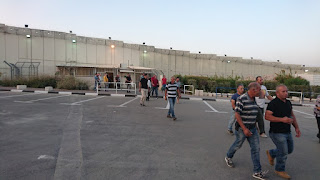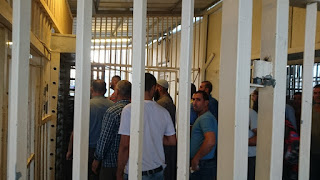November 2017
West Bank blues . . .
Earlier this month Benjamin Netanyahu visited Teresa May in
London to commemorate the centenary of the infamous Balfour declaration.
Balfour's declaration supported the Zionist vision of a secure home in
Palestine for the Jewish people persecuted throughout Europe: "a land
without people for a People without a land". The only problem is that the land they
selected did have a people: predominantly Muslims with some Jews and
Christians.
The Balfour declaration only supported a Jewish homeland,
not a Jewish nation or state. And it was on condition that "it being
clearly understood that nothing shall be done which may prejudice the civil and
religious rights of existing non-Jewish communities in Palestine".
But 1947, in the wake of the holocaust of WWII, the Jewish
people were given a state, Israel, and thus began the expulsion of the native
Palestinians.
Unfortunately, unlike the Indians in America, the
Palestinians did not die off after contact with the invaders. They were forced
into refugee camps, within Palestine and in bordering countries, where they
have grown in number.
Today the Palestinian people are divided in to different separate
groups: in the West Bank, in Gaza, in Israel, in refugee camps, and an diaspora
around the globe. And Israeli restrictions
on their movement prevents them from coalescing.
Israel's long-term ambition is the occupation of all the
land of Palestine from the River Jordan to the Mediterranean sea. And to
achieve this they have continued with a program -overtly and covertly - of
ethnic cleansing, by stealth.
They have in place a myriad of rules and regulation to
restrict the movement of Palestinians. They have laid siege to Gaza, and they are
using legal and illegal means to populate the West Bank with Jewish people.
Their definition of Jew is very unclear. Any of us Gentiles here in Ireland could
convert to Judaism and gain automatic citizenship of Israel and the right to
live in Jerusalem. But Palestinians born in Jerusalem do not have Israeli
citizenship, and have to go through a regulatory obstacle course to be allowed
live in their own home town.
Depite the Oslo Accords and the establishment of the
Palestinian Authority in 1994, the Israeli state is never going to grant the
Palestinians complete autonomy or independence. As recently as last week in
London Netenyahu said there could never be an independent Palestine. So they are actively maintaining a state of conflict, and heightened security.
The infamous wall has been built under the pretext of
"security". Supposedly along the so-called Green line, the 1947
border, between Israel and the West Bank, the wall actually encroaches on Palestinian
communities. It is cutting people of from their hospitals, schools and workplaces;
cutting farmers off from their farms. People can easily - if illegally- get
into Israel from the West Bank if they really need to. But legally they must
come through the checkpoints. So the wall is not there for security, but to
intimidate, and marginalise Palestinians. And to confiscate their land.
And to intimidate Israelis from having any contact with Palestinians.
And to intimidate Israelis from having any contact with Palestinians.
The signs at the borders between Israel and Palestine Area A
read: "The Entrance For Israeli Citizens Is Forbidden, Dangerous To Your
Lives, And Is Against The Israeli Law".
The army is also very important to maintain this pretence of
security.
Sahar Vardi in an Israeli woman, a peace activist from
Jeruselem. She was born to a father who refused to do his obligatory military service
during the first intifada, she has been protesting since her early teens. She told us (a group from Ireland) that she has been imprisoned "seven or
eight" times for refusing to do her military service. Her description of
the role of the army in Israeli life is reminiscent of the Catholic church in
Ireland 40 years ago. Everybody from an early age is taught to look up to it,
to accept it unquestioningly, and to take it for granted that they must serve
their time (three years for men, two for women) for the security of the
state.
It starts at the age of seven when children make presents in
school for their soldiers. For some it starts even earlier if they join the scouts.
But according to Vardi the army have said they no longer
need this conscription. They want people to train as professional soldiers, to
make a career in the army doing skilled jobs. They don't want short-term unskilled soldiers. But the Israeli government insists on maintaining the draft to instil the
belief that it is necessary for security and loyalty to the state.
But there is another reason why Israel wants to maintain the
high level of security.
June this year saw the 50th anniversary of the Six-day war,
when Israel invaded the West Bank, Gaza and the Golan Heights. It also saw in
Tel-Aviv the 8th ISDEF exhibition, "the premier international defence and
homeland security expo, catering to the needs of the Military, Police, Special
Forces, and HLS by exposing them to the products and solutions provided by
innovative defence and security companies worldwide".
A group of peace-activists managed to crash the event and
stage a minor sit-down protest. The ten activists were wearing black tee-shirts
with the slogan, “Israeli military industries profit from the occupation".
Military and security technology is a major export for Israel: sniper rifles and missile systems to the Serbs fighting in Bosnia;
assault rifles to the South Sudan army in violation of an EU arms embargo;
surveillance equipment to the Ugandan government to spy on LGBTQ activists; the
Arava cargo plane was used by Mexican, Argentinean, and Guatemalan governments
during the “Dirty wars” in these countries, to kill and disappear dissidents by
dropping them into the ocean in what became known as “death flights."
So the conflicts in Gaza and the Occupied territories
provide an excellent testing ground for all this technology; they are in effect
a showcase for the producers, who can show that the equipment they are offering
has been field-tested and is "battle-proven".
And the Israeli people don't realise what is being done in
their name.
After a tour of Hebron recently, our Israeli guide - a
former soldier, told us that we now know more about the situation there than most
Israelis.
Or as one woman, Barbara, told Joe Duffy recently, the
Israeli government keeps the Israeli people in a state of fear about
Palestinians.
Entrance to Israel from Bethlehem
Palestinians going through checkpoint to get to work in Jerusalem




No comments:
Post a Comment